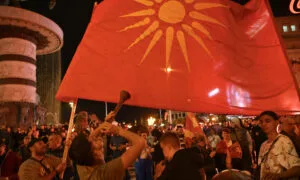Brussels -It took only a few days after the victory at the polls for the nationalists in North Macedonia, and the delicate diplomatic balance put in place in 2018 has already been jolted, triggering harsh reactions in the Balkan region and deep perplexity in Brussels about the seriousness of the new political establishment in fulfilling its international commitments to achieve the goal of EU membership. In the inaugural speech of the newly elected Macedonian President, Gordana Siljanovska-Davkova, the constitutional name of the country agreed with Greece in 2018 – North Macedoniamm- never appeared in line with the hard-line opposition of Vmro-Dpmne nationalists to the Prespa Agreement.

“I will respect the Constitution and the laws. I will protect the sovereignty, territorial integrity, and independence of Macedonia,” and “I declare that I will carry out the office of president of Macedonia conscientiously and responsibly” swore yesterday (May 12) the first woman President of the little more than 30-year history of independent Macedonia (now North), independent since 1991. The absence of “North” is no small detail. North Macedonia has been a candidate country for EU membership since 2005. Its path was obstructed until 2018 by Greece over the identity dispute over the use of Alexander the Great’s homeland name: both Skopje and Athens claim it as an exclusive part of their history and cultural heritage. Only with the Prespa Accords signed on June 12, 2018, by the then prime ministers of Greece, Alexis Tsīpras, and the Macedonian counterpart Zoran Zaev, did the Republic of Macedonia become Republic of North Macedonia and renounced the use of the Sun of Verghina – a symbol of the Macedonian royal dynasty – receiving in return from Athens the recognition of the Macedonian language and the green light for Skopje’s membership to NATO and the European Union.

From left: the then prime ministers of Greece, Alexis Tsīpras, and North Macedonia, Zoran Zaev, at the signing of the Prespa Agreement (June 12, 2018)
Yesterday in Skopje was a first taste -feared as much as expected – after the overwhelming Vmro-Dpmne election victory on Wednesday (May 8) not only in the Presidential but also in the legislative elections, in which the coalition led by the nationalists stopped just three seats short of an absolute majority in the future Parliamentary Assembly. Due to the intransigent positions displayed over the past few years or the tightened rhetoric during the election campaign, an increase in diplomatic tension between Skopje and regional neighbors with whom sensitive nationalist issues are still latent, primarily with Greece, can be expected. After the Greek ambassador to North Macedonia left Siljanovska-Davkova’s inauguration ceremony in protest, the Greek Foreign Minister, Georgios Gerapetritis, openly denounced the newly elected Macedonian president’s gesture, calling it “a flagrant violation of the Prespa Agreement and the Constitution of our neighboring country.” The minister of the Kyriakos Mītsotakīs-led cabinet also said that the official text of the oath of office referred to the country as ‘North Macedonia’ and, as a result, the choice to refer to it only as ‘Macedonia’ was intentional: “Progress on the European path depends on the full implementation of the Prespa Agreement and mainly on the use of the country’s constitutional name.”

The newly elected President of North Macedonia Gordana Siljanovska-Davkova (credits: Robert Atanasovski / Afp)
A principle that all of the European Union shares, particularly the leaders of the EU institutions. “For North Macedonia to continue on its successful path toward EU membership, it is essential that the country continue on the path of reforms and full compliance with binding agreements, including the Prespa Agreement,” said the European Commission President, Ursula von der Leyen, after congratulating the Balkan country’s first female President of the Republic. So did the President of the European Council, Charles Michel, who was even harsher in commenting on the “very disappointing” choice of Siljanovska-Davkova: “The EU recalls the importance of continuing to implement legally binding agreements, including the Prespa Agreement with Greece.” From the European External Action Service (EEAS) came a strong exhortation to the next government led by the nationalists: “They have a fresh start available to show that they are committed to the path to EU membership,” spokesman Peter Stano explained to the press today (May 13), refusing, however, to “speculate on what happens if they do not fulfill their commitments.” In other words, if Brussels decides to block the accession negotiations that started in the summer of 2022 after three years of waiting.
In the meantime, there are also fears of an escalation in relations with Bulgaria, in recent years the most problematic neighbor for Skopje on questions of a purely identity-based nature. “North Macedonia’s European perspective depends on the strict implementation of the international treaties to which it is a party, as well as on the negotiating framework approved by the European Council in July 2022, which will not be revised,” the Bulgarian president, Rumen Radev, already made clear. It was December 9, 2020, when Bulgaria in the General Affairs Council vetoed the start of EU accession negotiations with Skopje, which stalled for over a year and a half until the breakthrough in the summer of 2022. It was only thanks to the initiative of the French president, Emmanuel Macron, that the Bulgarian Parliament revoked its veto and the Macedonian Parliament approved the understanding: with the signing of the bilateral protocol between Sofia and Skopje, the situation was finally unblocked, and the first intergovernmental conference was reached on July 19, 2022.
Find more insights on the Balkan region in the BarBalkans newsletter hosted by Eunews




![La sede del Museo di arte orientale a Venezia [foto: Mao]](https://www.eunews.it/wp-content/uploads/2025/04/ca-pesaro-2-120x86.jpg)
![[foto: Vitold Muratov/Wikimedia Commons]](https://www.eunews.it/wp-content/uploads/2025/04/passeggini-120x86.png)